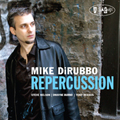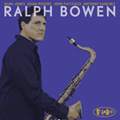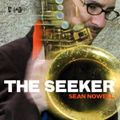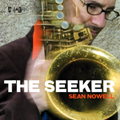Sean Nowell
BRM has done it again. We’ve hunted down, captured and documented the most innovative and exciting artists to recently emerge on a number of different scenes. All month long we’ll be running interviews with our discoveries to help get you ready for what’s to come in 2010. But to get a complete look at our full list of emerging artists, check out our current winter issue.
 Equally soulful and badass, Sean Nowell was studying to become a Baptist music minister while hitting up the downtown Birmingham, AL dive clubs that his mom warned him about. After leaving the minister track, the tenor saxophonist/composer acted as “unofficial artistic ambassador” for the Bond Street Theatre. The traveling musical theater group allowed him to bring the skills he learned from the cats in Alabama to places like Kosovo, Macedonia and Bulgaria. Nowell’s second album, The Seeker (which dropped this past June), plus the range of his current projects—an electric, beat-boxified funk group known as THE KUNG-FU MASTERS, right down to the Yutaka Uchida Quartet—reveal his truly unique brand of composition and improvisation.
Equally soulful and badass, Sean Nowell was studying to become a Baptist music minister while hitting up the downtown Birmingham, AL dive clubs that his mom warned him about. After leaving the minister track, the tenor saxophonist/composer acted as “unofficial artistic ambassador” for the Bond Street Theatre. The traveling musical theater group allowed him to bring the skills he learned from the cats in Alabama to places like Kosovo, Macedonia and Bulgaria. Nowell’s second album, The Seeker (which dropped this past June), plus the range of his current projects—an electric, beat-boxified funk group known as THE KUNG-FU MASTERS, right down to the Yutaka Uchida Quartet—reveal his truly unique brand of composition and improvisation.
BRM: You came to New York City from Birmingham, Alabama. What was the music scene like growing up?
Sean Nowell: The music scene in Birmingham is heavily influenced by New Orleans— the Meters, stuff like that. That sort of sound: southern rock, southern funk. I grew up playing with the old cats in dive clubs in downtown Birmingham that my Mom did not want me go to, but I did anyway. It was great. I learned how to swing with the old cats, and I got vibed by some of the other old cats, and then came back and whipped some ass.
Why did you decide to go to Berklee College of Music?
Well, I was attending a small, Southern Baptist college for a couple of years, studying on a track to become a Southern Baptist music minister. I was really into that, that’s what I grew up doing—I grew up singing in church all the time and touring around with different choirs. Basically I was going to church at least three times a week, doing my thing. Finally…one day I had an epiphany that I really needed to learn how to play jazz saxophone. Like for real. I had played jazz, kind of, since I was a freshman in high school…playing saxophone really got me the most excited, but I loved doing the church music thing, too. Shortly thereafter I met this piano player named Victor Atkins. Victor Atkins is from Selma, Alabama, about 8 or 9 years older than me. And I saw him play piano and he sounded just like Jamie Kirkland, McCoy Tyner and Marcus Roberts— all those guys I really connected with on piano. I like that sound, and I saw him playing like that, and I just couldn’t believe it… I didn’t know that you could do that. I thought that was just for other people to be able to hear, you know?
He’s kind of like the same guy…coming from the same environment I was, and showing me you could actually do that. So I asked him how he learned to do what he was doing and he said he went to the Berklee College of Music. So the next day I made an audition tape, just like that. Got a partial scholarship to go there, and just went. Didn’t visit, didn’t ask any questions, I didn’t want to know.
How did you end up in New York?
The way I got to New York was, the next thing that [Atkins] did, in his life, was he went to Manhattan School of Music and got a master’s degree. So that was exactly what I did. After Berklee, where I got a degree in jazz composition…I got my master’s [and] I went back down south for about 6-8 months, touring with a Dead and Phish cover band, which was awesome, doing frat parties all around the southeast. Then [I] moved to New York. Here we are…That’s pretty much it.
How’s everything been going with your new album (The Seeker), since it came out in June?
Going great, getting tons of reviews. I got a great review today as a matter of fact. The critics seem to really like it, so I guess we did have a pretty good day that day.
It was recorded in one day?
Yeah, about a ten hour day of just straight recording. It’s nothing but a snapshot of what we happened to be feeling that day. It’s a great record, I really am happy with it, but it’s just a moment in time.
A lot of jazz records are the same way though, no?
Yeah. I have friends that make R&B records that take ’em like a year. It’s insane. I’m like, “No kidding, wow. We did this all in…daytime.” You know what I mean? It wasn’t even 24 hours.
Can you talk a bit about the instrumentation on the album? I’m pretty sure I heard a cello in there…
Well basically, the coolest thing about being a NYC jazz musician is that it’s like the ultimate music salad bar. There’s everything in the world you could ever want to try. And then eventually you make your way around to try it. So I…for example, I play with a hammer dulcimer player, we play traditional African music, and also original music based on African and Indian music. So it’s a hammered dulcimer player, a six electric bass player from Japan, and this pandero drumset player. It’s freakin’ nuts. So there’s that’s project, then there’s all kinds of other projects, including the way that I met this cello player. I was playing a jam session in my neighborhood, and this cello player just happens to walk in. And everybody’s like, “Hey, what’s this guy doing here?” And he rips out his cello and just starts throwing down. It’s really cool because you don’t normally expect to have a cellist totally throwing down at a jam session. It was pretty hardcore. Turns out he lives across the street from me, which is pretty cool. Also turns out he’s the cello player from Evanescence. He’s a pretty big cat in the world classical/pop crossover thing going on now, buddies with Josh Groban and all those dudes.
What’s it like being married to actress Kirsten Wyatt, another artist?
It’s all I ever wanted in my life, for all my friends to be super cool, super creative musicians…or actors, you know, or people. And those are the people that I like to be around the most, and those are the people that I often am around the most. My wife’s been in…this will be her 6th Broadway musical that she’s been in, she’s in Shrek the Musical. She was in Grease before that. She really gets it. I mean, her dad is a tenor sax player and her mom is a percussionist, and they are both band directors in West Virginia. She knows what it is. It’s pretty great, I get a lot of support.
It was kind of a done deal when we first met. From the downbeat, from the moment, I’ve always liked hanging out with actors. They’re generally a lot more interesting and a lot more fun than jazz musicians. A lot of jazz musicians, they’re pretty neurotic about their playing, worried about getting better, about other people being better than them, just minute, minute details—the music or the scene, that there’s not enough scene, or not enough gigs…getting paid a lot but it’s not inspiring, not getting paid but it’s super inspiring…you get the idea with jazz cats. But actors are generally about just having a really good time. It’s a pretty self-sufficient hang when you hang with actors. They’re pretty chatty, so instead of having to carry a conversation a lot, which I do with musicians, I just get hang back and be like, “Yeah, what she said.” It’s kind of fun. A lot of energy, a lot of social energy, and I really enjoy it quite a lot.
How did you choose the cover songs on the album? What’s figuring out that balance like?
Well, for one, the label wanted me to do a couple of covers. So there’s that. [Posi-Tone Records are] really cool, super supportive. They’ve been around a while, but they’re starting to come into power. Honestly, I feel really fortunate to be on their team, kind of like the ground force of something that’s really gonna be big in the jazz world. They’re great guys, and I stand behind them. That’s a rare thing, because when you’re working with record labels, people have a certain run of their record and that’s it.
A couple of these covers have a really deep personal meaning for me. “I Will” [originally by The Beatles] is the song that my wife walked down the aisle to. It’s a beautiful song, and “I Will” is imprinted on the inside of my ring, so, you know, there’s a deeper meaning to that. One of our favorite tracks to listen to is by this trumpet player, Dave Douglass and it’s a cover of “Poses,” by Rufus Wainwright. It’s really great music to wake up in the morning to. Starts out really quiet and mellow, and then builds until you’re awake. Then there’s another cover that’s a traditional Bulgarian tune, “Oy Matze Matze.” I spent a lot of time in Eastern Europe with this crazy avant-garde theatre company, called Bond Street Theatre.
Is that when you were in Kosovo?
Yeah, exactly. Same trip, where this tune comes from. We played this wordless version of Romeo and Juliet with a Bulgarian theatre company and toured it all over Kosovo and Macedonia and Bosnia. It was insane.
How’d you get involved with Bond Street?
My first summer in NY, actually, right before I moved to NY, between Alabama and moving here, I visited Europe for the first time. I went with my buddy, and we wandered around and visited a bunch of friends out there, because most of my friends from Berklee were European. So I really wanted to get back there real bad. And I answered this ad at the job board at Manhattan School of Music that wanted a saxophonist, pianist, clarinetist, composer, actor, comedian, acrobat, stilt walker, the list goes on. So I like, was crazy yes…but I kept reading and it said: “…for two month salary tour of Europe.” So I didn’t care what it was, I just went down there and met with these people…and I still work with them, after 13 years now. We toured all over the world together. We toured South America a couple times, Asia a couple of times, Western Europe, Eastern Europe a whole bunch of times. It’s crazy. We’ve done amazingly and fantastically fun and exciting things that I never thought I’d be involved with. And also some really scary and dangerous things where I literally thought I was going to die.
Was this during the war?
No, right after though. We were in Bogota, Colombia for a couple weeks one time and every night there’d be a themed, giant Cumbia dance party. Cumbia is kind of like African rhythms and Egyptian scale kind of stuff. Which is great, it’s a great sound, lots of giant drums being played. A lot of instruments, a lot of horns and we were part of the international theater festival… so every night there’d be a huge dance party with live music in this atrium of this theatre in this historic section of Bogota, under the stars with a zillion Capoeira dance company, you know, acrobatic, kung-fu dancing. And they were pouring aguadiente all over everybody, like the fire water version of South America. So big giant dance party and we went snorkeling off the coast of Venezuela one time, with all these national parks, we went to an iguana reserve, which was crazy and beautiful. I got to go to the Great Wall and walk all over the Great Wall in China because I was on tour with this theater company. I’ve gotten to meet fantastic and interesting people all over the world just because I happened to be in town.
On the flip side, one time [I got] punched in the mouth by a Bulgarian mobster because I was playing during quiet hours in the afternoon that I didn’t know about. I was playing out in the woods, by the Black Sea, about 60 yards away from the hotel we were staying at. And all of a sudden I turn around and big crazy dude is on top of me, just punching me right in the mouth and tries to steal my $4000 soprano saxophone. And I got told later that it was quiet hours. The mob is the law in Bulgaria. So I couldn’t really eat or play for about a week and a half. It was a mess.
Then we toured in Kosovo, where we’d be driving in a van powered by auto-gas. Auto-gas is essentially compressed gas fumes in a tank inside the van. So if you get in a wreck or something, the van immediately blows up. It makes the van like a giant hydrogen bomb. I was in the van, and we traveling through wilds of Kosovo: cliff roads with no guard rail, with a few thousand foot drop on the right, mountains on the left and it’s like, a lane and a half. Freaking giant trucks coming directly at you the other way and you have to swerve around each other, and I just about lost my cookies. I had to sedate myself. Oh, and then we’d get to whatever town we were playing, and sometimes they wouldn’t have electricity, and you’d hear missiles exploding in the distance. So that was exciting. Also I almost got kidnapped a bunch of times, if it wasn’t for the German military giving us an escort. They were like, “Yeah, you guys didn’t see it, but there were bandits and rebels lining the road—if you guys had tried to make this journey on your own, you’d be prisoners.” And the only reason we had military escorts was because we played a party for the German military police.
That worked out nicely…
It definitely worked out. You know, I’ve had some really fun experiences, really fun, and some really, really, really dangerous ones that I’m not interested in having anymore. So I’m happy that I’m more settled now, and getting more momentum on the NYC jazz scene.
Yeah, I was going to ask if you see yourself doing another tour like that any time soon, or if you’re content sticking around the city for the foreseeable future.
My wife is not allowing me to go back to those wild type of tours, which is fully understandable. I can totally see it. The only really wild stuff I’m planning on doing, maybe next year, is applying for the Rhythm Road Jazz Ambassadors tour—which I was going to do this year, but then I decided to do this record stuff, which is cool. But basically it’s a U.S. Government/U.N. Embassy tour, where…they send you to different regions of the world and it’s basically to spread the word of American jazz. So that’s the only thing I have planned on that end.
It sounds a little more structured.
Oh, yeah—more structured, a little higher pay, more security…Oh, when we were in Colombia that one time we had bodyguards, actually. And we had one really big dude with, like, a 9mm gun, and a little, small girl with one of those front backpacks with an Uzi in it. So that was fun. But we’ve done a lot of other tours that were more low key, and really beautiful—South of France, without those security issues. The others just make for better stories.
So the beatboxer in your group, The Kung-Fu Masters, is a new addition?
I was doing a gig, back with a bunch of modern dancers that he was involved with. And he’s this Russian guy. But he’s great, his name’s Alex but he goes by KRUSSIA. He’s great, a big time up and coming rapper that raps in Russian. Great beatboxer.
I view modern jazz these days as a sponge, absorbing all the good stuff that’s going on around it. Being in NY, seeing African music one night, indie rock the next night, incredible classical the next night. I have to live here, I have to. I can’t say I’m going to move to X city, where I can be a big fish in a small pond; I have to make my stand here. That’s it. I’m trying to make my mark, and the city’ll make its mark on me. For better or worse, I’m here no matter what. It’s liberating in a way, to know that I don’t have any other option but to stand and fight. I’ll make it happen, that’s it.
Words by Erica Block
Photo by Kyle Timlin







 Sean Nowell
Sean Nowell


